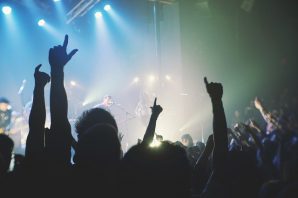
I forgot to mention something in my review yesterday of Joe Jackson’s concert — it started a half-hour late. Our tickets said showtime was 8:00pm, but it was a little past 8:30pm when Joe finally took the stage.
This is not a new phenomenon. I’ve seen it happen over and over again in the 40+ years I’ve been attending live musical events. There’s no excuse for it.
I remember taking my daughter to a Bruce Springsteen concert at the Scottrade Center in 2009, when he didn’t hit the stage until more than an hour after the scheduled start time. The excuse he eventually gave us was that he and the E Street Band had been working on the setlist. My reaction was, what, you couldn’t have done that during the downtime you had after your afternoon sound check? Or at lunch time? Incidentally, that night, Bruce and the boys played the “Born To Run” album in its entirety, so that’s seven songs they didn’t have to discuss. Even if you’re gonna mix it up with a different group of tunes every night, or move around the order, that shouldn’t take so long that it delays you strumming your first notes at the time it said you would on our tickets!
It’s even worse if there’s an opening act. Not only do they regularly start 10-15 minutes late, but when they’re done, we have to wait while the roadies remove their equipment and put the headliner’s stuff in place. Even then, once everything’s exactly the way it’s supposed to be, the band we all came to see doesn’t come running out for another half-hour.
This does not happen in other performance venues. I’ve never been made to wait a half-hour by the St. Louis Symphony, or by a show at The Fox or The Rep or The Muny. The audiences would never put up with it for more than five minutes. But it’s standard operating procedure for concerts.
Imagine going to see a new Pixar movie (e.g. “The Incredibles 2”), which is usually preceded by a short (e.g. “Bao”), but after that little animated entertainment ended, the lights came up and you had to wait another 20 minutes before the main feature started. It’s bad enough you have to sit through 15-20 minutes of previews and commercials — at least the theater starts those at the time they said they would!
It’s the artists that have created this problem, and they’re the only ones to fix it. If bands made a habit of starting on time — or if venues demanded they do so and promoted that fact — the crowd would show up early enough to get down the aisles in time to hear the first notes of the first song.
Some acts might claim the reason they start late is because not everyone in the audience has made it to their seats yet, or to accommodate latecomers. Funny, the major sporting leagues always start their games right on time, regardless of how many fans are in the stands. The fact that they’re televised has a lot to do with that, but even so, I’ve never seen a baseball game delayed 15 minutes because the managers were still working on the batting lineup.
You know where this is never a problem? Las Vegas, because the casinos don’t want customers in the concert venue for any longer than necessary. I’ve heard big headliners (e.g. Rod Stewart, who I reviewed here) hit the stage right on time and announce that the show is only gonna be 90 minutes — because the management wants you back at the slot machines and table games as soon as possible.
While we’re at it, it’s time to get rid of encores and the cell-phone-swaying-in-place-of-cigarette-lighters nonsense that comes with them. Why do we have to put up with the band pretending to say good night, leaving the stage, then waiting several minutes in the wings while the applause continues before returning to play another song or two or three? We’ve been showing them love throughout the evening — why do they need extra confirmation of it before entertaining us some more? It’s not a surprise they’re coming back.
Just as performers and venues can train an audience to be there for an on-time start, they can do the same with the end of the show. All it would take is to abandon the faux-finale and replace it with a simple announcement: “This is our last song.” Then, when it’s over, the band offers a genuine “Good night!” as it walks off, the lights come up, and everyone goes home.
